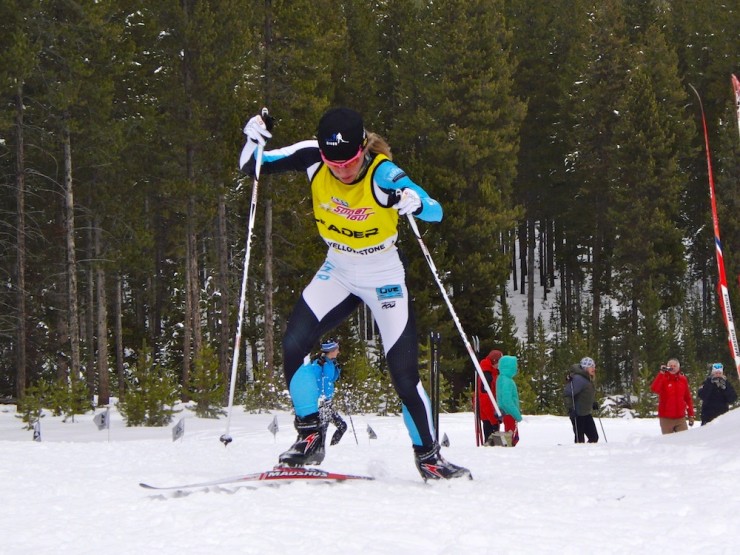
WEST YELLOWSTONE, Mont. – Watching her husband round the 5-kilometer race course at the Rendezvous Ski Trails three times on Saturday, Caitlin Gregg (Madshus/Team Gregg) had a sense it was going to be another good day.
Less than 24 hours after winning the qualifier and every heat of the women’s 1.3 k freestyle sprint – including the final – on Friday, Gregg was witnessing her hubby Brian make a run for SuperTour podium as well. He ended up second in the men’s 15 k freestyle individual start, 14.1 seconds behind Mads Strøm, a Norwegian freshman at the University of Colorado (CU).
Congratulating Brian afterward, Gregg maintained her focus for her 10 k freestyle race, and Brian didn’t waste time getting out on the course to cheer her on. She had played it cool all morning, not letting Friday’s victory take hold of her – or the cold symptoms she was fighting when she woke up Saturday.
“I pretty much used that mind over matter thing: I just said, let’s go with it,” Gregg said. “I was walking around this morning and I was super chill and super calm because I didn’t want to use up any extra energy before the race. … I told Brian, basically, ‘I want to kick my own butt today.’ ”
The second A-seed in a field of 83 women, Gregg knew her best gauge during the race would be her own intuition; back splits wouldn’t be available. So she pushed – hard on the first lap and even harder on the second at nearly 7,000 feet above sea level.
Having faith in her summer altitude training in places like Utah, Canada and Truckee, Calif., and results in unofficial races, such as the Frozen Thunder distance time trial on Nov. 1 in Canmore, Alberta (which she won), Gregg didn’t worry about red-lining or taking herself out of contention.
That all-or-nothing attitude resulted in her second straight victory in as many SuperTour races this season. Gregg won the 10 k by more than a minute and 20 seconds in 25:45.6.
After arriving in West Yellowstone about a week and a half before the races, Gregg said she mostly trained alone to practice the feeling of skiing hard in strategic parts of the course.
“I was able to work on some pacing tactics and different aspects of the terrain to know where to find the seconds,” she said. “I think that was a huge advantage … because when I did see the start list, I knew that it would be more of a time trial.”
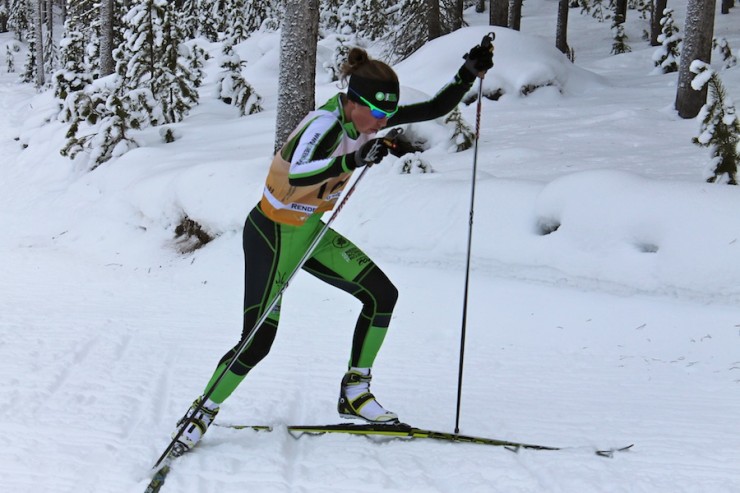
By the time she ascended the most significant climb on Saturday, Tele Hill, it was clear to coaches timing their own athletes that Gregg was way ahead of anyone else. Caitlin Patterson of the Craftsbury Green Racing Project (CGRP), who ultimately placed second, said Gregg was 25 seconds ahead of her around two kilometers in, when Patterson was in third.
“That was a little bit of a shock but I tried not to let it bother me too much,” Patterson said. “It’s good to hear splits, but to some extent you have to just keep trucking along, especially at altitude when weird things can happen.”
Bonking is a very plausible reality for most skiers in a distance race at high elevations – less oxygen makes it difficult to dig deeper and easy to slow down. And with choppy conditions on the uphills on a damp day in the mid-30s, the hardest parts of the course were even tougher.
But bonking wasn’t part of Gregg’s plan. She didn’t really consider it, and by her second and final time up Tele Hill, she was well over a minute ahead of anyone else.
“I’ve been joking with some people that this year is one of those years to just go big and see what happens, and to put it all out there,” Gregg said. “If I don’t do that, I’ll never know. I figure if I do and it doesn’t happen at least I gave it my all.”
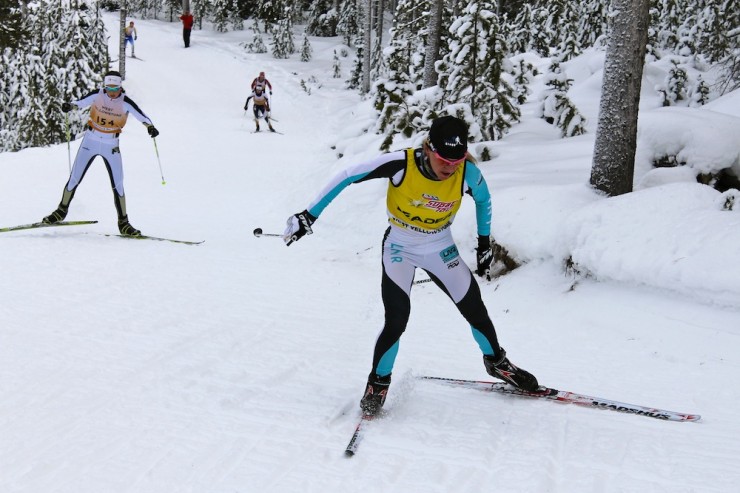
By it, Gregg means qualifying for the 2014 Olympics in Sochi, Russia, which would be her second Olympics since the 2010 Vancouver Games. She could do so by continuing to lead the SuperTour circuit through next weekend’s races: a classic 10 k and classic sprint in Bozeman, Mont. On Friday, Gregg said she was grateful the SuperTour opened in West Yellowstone with skate races to boost her confidence.
The male and female SuperTour leaders will earn World Cup starts in Europe in January, giving them an opportunity to show their capable of solid international results as well. From there, a U.S. Olympic team will be named.
For Team Gregg, Saturday’s results were a step in the right direction toward that goal; Brian was the top American in the 15 k.
“It’s incredible,” Gregg said. “It’s so fun when this stuff happens.”
All the preparation she and Brian did, especially through last winter with Methow Olympic Development Coach Scott Johnston, paid off. Since forming Team Gregg for this season, Caitlin said she’s been writing her own training plan.
“We are super grateful for the training [we did with him],” Gregg said of Johnston. “He has some really innovative ways for training and I think that’s been really helpful for Brian and I. … I’d say he one of the best technique coaches I’ve ever, ever worked with.”
In second place, Patterson was a little discouraged by finishing 1:21.4 minutes behind Gregg.
“I never like being beaten by so much, but Caitlin Gregg must’ve been really flying today, and I can see that she’s in really great shape,” Patterson said.
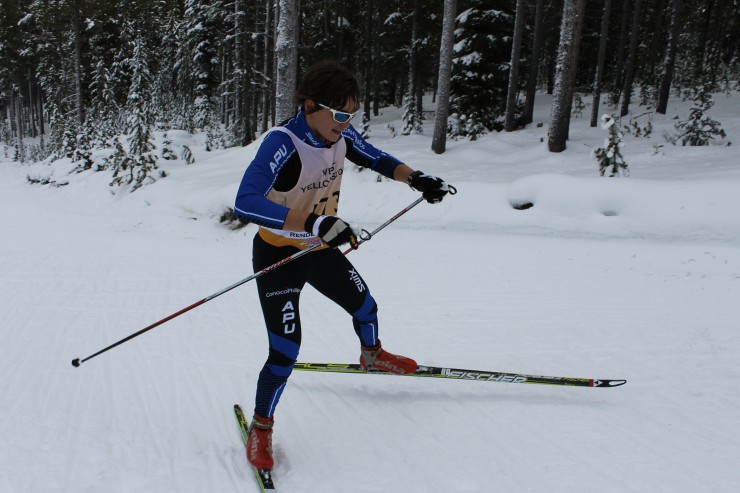
After turning up her tempo after the first couple kilometers, Patterson heard she was in second for most of the race. She stayed there, finishing 24.4 seconds ahead of Kate Fitzgerald (Alaska Pacific University) in third.
For Patterson, the key was skiing conservatively to start, but making sure she wasn’t holding back too much. “I did a pretty good job pacing, not bonking at all,” she said.
“Podium was my goal [so] I’m happy with it, definitely,” she added. “I would’ve liked to have been closer to the lead, but there’s nothing I can do about that now except ski faster next race.”
Third most of the race, Fitzgerald kept her position with an 11-second margin over Sylvia Nordskar (University of Denver) in fourth. She had a sense it was going well, feeling “big and powerful” and remembering to stay in control.
“It was just steady work the whole time, just keeping it steady and not freaking out at any one certain part,” Fitzgerald said. “You couldn’t really kill the uphills. There’s not enough time to recover if you tap out.”
“I’m pretty stoked to have a podium,” she added. “It’s a big year and everyone is really excited about the Olympics. I think it’s pretty sweet.”
Following in fifth, Erika Flowers of the Stratton Mountain School T2 Team (SMST2) finished 2:02.6 back from Gregg. Independent skier Cambria McDermott was sixth, Eliska Hajkova (CU) placed seventh, Annie Pokorny (SMST2) was eighth, Jessica Yeaton (Montana State University) took ninth, and Mary Rose (Sun Valley Ski Education Foundation) was 10th.
— Mark Vosburgh contributed reporting
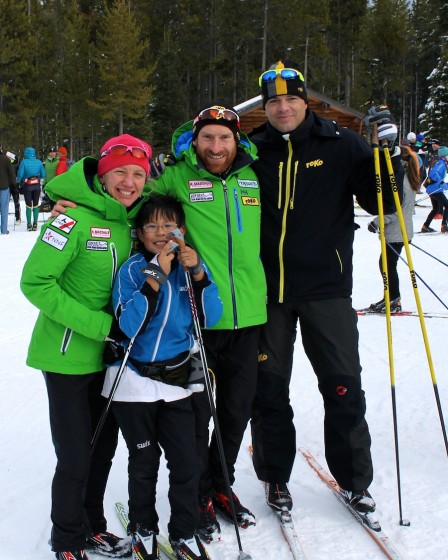
Alex Kochon
Alex Kochon (alexkochon@gmail.com) is a former FasterSkier editor and roving reporter who never really lost touch with the nordic scene. A freelance writer, editor, and outdoor-loving mom of two, she lives in northeastern New York and enjoys adventuring in the Adirondacks. She shares her passion for sports and recreation as the co-founder of "Ride On! Mountain Bike Trail Guide" and a sales and content contributor at Curated.com. When she's not skiing or chasing her kids around, Alex assists authors as a production and marketing coordinator for iPub Global Connection.



